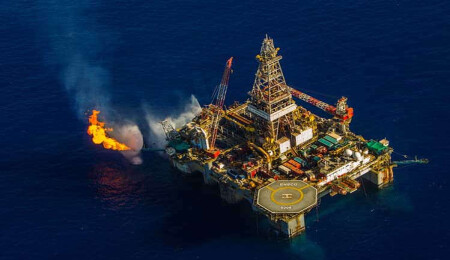Greek Cyprus sends vessel for drilling in East Med

The Greek Cypriot administration has issued a navigational telex (Navtex) to announce drilling activities by Exxon Mobil-Qatar Petroleum in the self-declared exclusive economic zone (EEZ) in the Eastern Mediterranean on Monday.

The Navtex announced that the drilling activities will take place between Nov. 19, 2021 to Jan. 22, 2022, Anadolu Agency (AA) reported Monday.
Navtex is a maritime communications system that allows ships to inform other vessels about their presence in an area and relay other information.
In a statement last week, Greek Cypriot Energy Minister Natasa Pilides said the process would take two to three weeks and its results would be announced between February and March 2022.
Previously, the Greek Cypriot administration had issued a Navtex regarding seismic exploration vessel Nautical Geo’s activities in late September.
Last week, Turkish Vice President Fuat Oktay said energy resources in the region provide cooperation opportunities for both sides, as he criticized the Greek side for its unilateral hydrocarbon activities.
“But don’t you worry, we will not leave them alone and will resume our drilling activities from where we left off,” he said.
Turkey, which has the longest continental coastline in the Eastern Mediterranean, has rejected the maritime boundary claims of Greece and the Greek Cypriot administration, stressing that these excessive claims violate the sovereign rights of both Turkey and the Turkish Cypriots.
Turkish leaders have repeatedly stressed that Ankara is in favor of resolving all outstanding problems in the region through international law, good neighborly relations, dialogue and negotiation. Turkey has also criticized the European Union’s stance on the Eastern Mediterranean conflict, calling on the bloc to adopt a fair attitude regarding the dispute and give up favoring Greece under the pretext of EU solidarity.
Ankara sent its drillships searching for energy on its continental shelf, asserting its own rights in the region as well as those of the Turkish Republic of Northern Cyprus (TRNC).
Turkish leaders have repeatedly stressed that Ankara is in favor of resolving all outstanding problems in the region through international law, good neighborly relations, dialogue and negotiation.
Cyprus has been mired in a decadeslong dispute between Greek and Turkish Cypriots, despite a series of diplomatic efforts by the United Nations to achieve a comprehensive settlement.
Ethnic attacks starting in the early 1960s forced Turkish Cypriots to withdraw into enclaves for their safety.
In 1974, a Greek Cypriot coup aimed at Greece's annexation led to Turkey's military intervention as a guarantor power to protect Turkish Cypriots from persecution and violence. As a result, the TRNC was founded in 1983.
It has seen an on-and-off peace process in recent years, including a failed 2017 initiative in Switzerland under the auspices of guarantor countries Turkey, Greece and the United Kingdom.
The Greek Cypriot administration entered the EU in 2004, the same year Greek Cypriots thwarted the U.N.-led Annan plan to end the longstanding dispute.
Both Turkey and TRNC have said a permanent peace in Cyprus can only come through the international community’s recognition of two separate states, upending decades of negotiations to reach a federation-based reunification accord.


Comments
Attention!
Sending all kinds of financial, legal, criminal, administrative responsibility content arising from illegal, threatening, disturbing, insulting and abusive, humiliating, humiliating, vulgar, obscene, immoral, damaging personal rights or similar content. It belongs to the Member / Members.